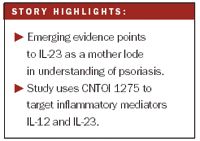- Case-Based Roundtable
- General Dermatology
- Eczema
- Chronic Hand Eczema
- Alopecia
- Aesthetics
- Vitiligo
- COVID-19
- Actinic Keratosis
- Precision Medicine and Biologics
- Rare Disease
- Wound Care
- Rosacea
- Psoriasis
- Psoriatic Arthritis
- Atopic Dermatitis
- Melasma
- NP and PA
- Skin Cancer
- Hidradenitis Suppurativa
- Drug Watch
- Pigmentary Disorders
- Acne
- Pediatric Dermatology
- Practice Management
- Prurigo Nodularis
- Buy-and-Bill
Article
New approach 'highly effective' in psoriasis tx
Author(s):
National report - A new approach to treating psoriasis targets the inflammatory mediators IL-12 and IL-23 and has proven to be highly effective in a large phase 2 clinical trial.

This landmark study was published in the Feb. 8 issue of the New England Journal of Medicine.

Dermatology Times spoke with Gerald G. Krueger, M.D., the lead author of the paper and a professor of dermatology at the University of Utah School of Medicine, Salt Lake City.
"The efficacy was a bit of a surprise to most of us; even at the lowest dose it worked extremely well," he says. "In those who achieved PASI75 at the low dose at 12 weeks, it isn't until week 24 that you start to see a significant erosion of response. This tells me that there is a cohort of people that respond really dramatically to this drug."

"While there is a dose response, the difference in the number of subjects who achieved PASI75 at week 12 is not as dramatic as would be expected, making the total dose or regimen less important."
The data supports the notion that there is a subset of patients "who are hyper-responders and do not need much to get better." This suggests to him the importance of still unknown host genetic factors.
CNTOI 1275 has a half-life of about 21 days. So what accounts for the duration of the therapeutic effect?
"It tells me that you are shutting off a selected cell population, and in doing that, you are allowing, I am going to guess, inherent suppression to gain traction," Dr. Krueger says.
Mechanism of response
"One of the things that we know about psoriasis is that it is a disease that tends to get better and worse naturally.
"So, if you had a drug that enhanced inherent suppression, it would affect the duration of response. I think this concept is going on but, because it is not known, I am unable to tell you what that is at a mechanistic level."
Understanding the mechanism of a durable effect at even the lowest dose is important. Dr. Krueger says, "This type of response tells me that the agent can shift a major pathway or this drug is very specific to psoriasis; if it alters an element that is central to the body's immune response system there may be some long-term harmful side effects from it." So far, that has not been the case.






